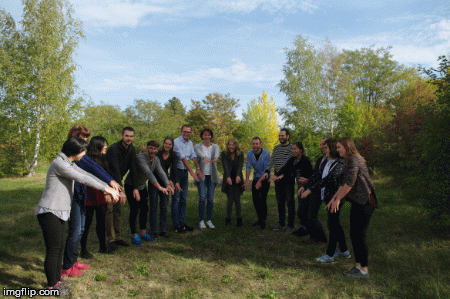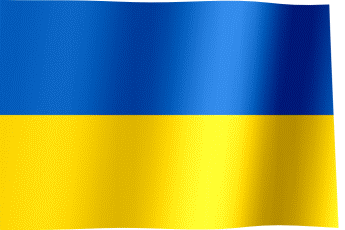Plant Nutrition (Peiter lab) Pflanzenernährung
International Conference of the German Society for Plant Sciences
BOTANIK-TAGUNG 2024

The Botanik-Tagung 2024 - International Conference of the German Society for Plant Sciences (DBG) will be held at the Martin Luther University Halle-Wittenberg on 15 - 19 September 2024.
Please click here for further information.
Welcome to the Plant Nutrition Laboratory!
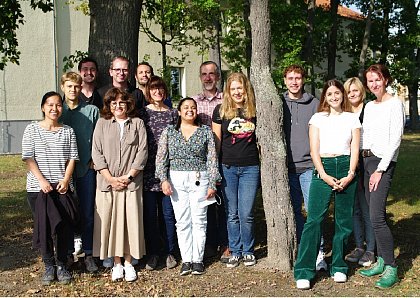
Mineral nutrients play many essential roles in plants as building blocks, catalysts and signalling agents. Our group focuses primarily on the way nutrients are transported and how this determines their function, but we also work on other aspects of plant nutrition.
On our web pages you can find out more about us, our goals, and our achievements.
In Germany, the scientific area of Plant Nutrition is represented by the German Society of Plant Nutrition. Click here to access the web pages .
Willkommen bei der Professur für Pflanzenernährung!
Mineralnährstoffe spielen in Pflanzen essentielle Rollen als Bausteine, Katalysatoren und Signalstoffe. Unsere Arbeitsgruppe interessiert sich in erster Linie für den Transport und die Funktionen von Pflanzennährstoffen, aber auch für andere Aspekte der Pflanzenernährung.
Auf unseren Webseiten können Sie mehr über uns, unsere Ziele und unsere Fortschritte erfahren.
In Deutschland wird das Wissenschaftsgebiet der Pflanzenernährung durch die Deutsche Gesellschaft für Pflanzenernährung vertreten. Folgen Sie diesem Link, um zu deren Webseiten zu gelangen.
Leider existieren die meisten Seiten momentan nur in englischer Sprache. Im Verzeichnis sind deutsche Seiten mit (D) markiert.
News - 28 February 2024
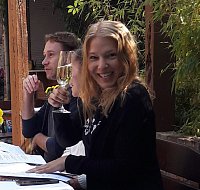
28 February 2024
Goodbye and Tschöö, Steffi!
We have to say farewell to Stefanie Höller, who was a member of our lab for many years. Building on her background in metals and oxidative stress, Steffi has developed projects on iron and manganese homeostasis with exciting insights into novel mechanisms that are in the pipeline for publication. In addition to her own research, she was tremendously liked by our students, who she has supervised in internships, thesis projects, and her own modules. Steffi also did a fantastic service to the entire plant nutrition community, which she enthusiastically supported as Managing Director of the German Society of Plant Nutrition, including the development of its new websites. We are delighted that Steffi will be continuing her journey in academica as a permanent lecturer at the Biology Department of the University of Düsseldorf. The students will love her! Steffi - all the very best back im Rheinland!
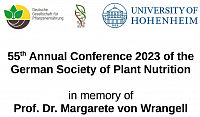
25 - 27 September 2023
Participation at Plant Nutrition Conference
We went to the 55th Annual Conference of the German Society of Plant Nutrition (DGP) , which was organized by the University of Hohenheim and held in the historic premises of Hohenheim castle. Oriana was selected for an oral presentation on organellar calcium and manganese transport; Steffi, Sri and Stan presented posters. Sri continued her winning streak and received the fourth time a prize for her innovative poster. Congratulations, Sri!

18 - 19 September 2023
DBG @ Halle
We hosted a very constructive and energetic two-day meeting of the extended board of the German Society for Plant Sciences (DBG) to take stock and forge the future of this institution that brings together plant scientists in Germany.
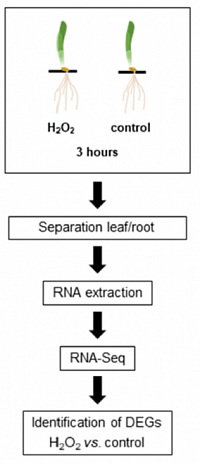
12 September 2023
How barley responds to oxidative stress
In cereal crops, such as barley, the ability to appropriately respond to environmental stress is an important factor for yield stability and thus for agricultural production. Reactive oxygen species, such as hydrogen peroxide, are key components of signal transduction cascades involved in plant adaptation to changing environmental conditions. Hydrogen peroxide-mediated stress responses include the modulation of expression of stress-responsive genes (transcriptome) required to cope with different abiotic and biotic stresses. A study led by Ute Vothknecht and Fatima Chigri of the University of Bonn with contributions from Bastian and Edgar of our lab identified global transcriptomic changes in barley subjected to hydrogen peroxide. More than a thousand differentially expressed genes were identified in roots and leaves. The data obtained in this study provide an insight into the molecular mechanisms of oxidative stress responses in barley, which also play a role upon other stresses that induce oxidative bursts. The article is published in Frontiers of Plant Science and can be accessed here.

11 September 2023
Congratulations, Dr Rössner!
Today Nico Rössner very successfully defended his PhD thesis on how plants handle calcium in the Golgi apparatus. Nico was our first student in the vibrant DFG-funded Research Training Group 2498 to which he contributed much enthusiasm. Nico started as Master student in our lab and became an invaluable team member and friend. All the very best for the future and thank you for everything you contributed!
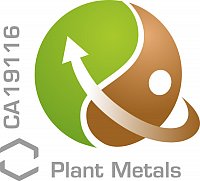
5 - 9 September 2023
Participation at Plant Metals and ICOBTE/ICHMET conferences
Edgar presented a talk on our work on metal transporters in model plants and crops at the conferences of the PLANTMETALS COST Action on Trace Metal Metabolism in Plants and ICOBTE/ICHMET, which were held in Wuppertal.

6 - 10 August 2023
Participation at Gordon Research Conference
Edgar was invited to an exciting GRC on Organellar Channels and Transporters where he presented a talk on our recent work on transporters for calcium and manganese in plants.

3 July 2023
Welcome Marc!
Today, Marc Knight has arrived from Durham (UK) as MLU Visiting Professor. Since many years, Marc is shaping and stimulating the field of plant calcium signalling research. We are very happy that he will stay with us for the next weeks and again in October.
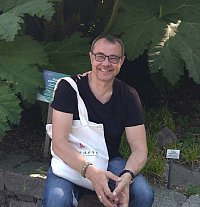
3 June 2023
Ласкаво просимо Станіславе!
Today, Stanislav Isayenkov has arrived from Kyiv (Ukraine). He will pursue an exciting research project on salt tolerance mechanisms of barley relatives. We are immensely happy that the successful application for a fellowship of the Philipp Schwartz Initiative, funded by the Alexander von Humboldt foundation, will allow him to conduct research in a safe environment and to further his career.
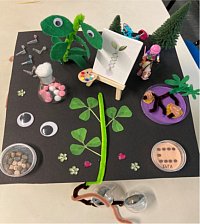
15 May 2023
Congratulations, Dr Bischoff!
We are very happy that Lisa Bischoff successfully defended her beautiful PhD thesis today on the role of calcium as regulating agent in root nodules and its transport across symbiotic membranes. We wish her all the very best for the future and say a big Thank You for all her contributions to our lab.

28 April 2023
Congratulations, Jie!
Today our former PhD student Jie He (aka. Tiffany) received the Dorothea-Erxleben price of the Martin Luther University, which is awarded for the most outstanding PhD theses. This is a fantastic achievement and a reward for all the enthusiasm, hard work, and inspiration that Jie put into her project. As press release by the University (in German) can be found here.
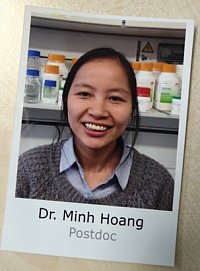
Minh_farewell
26 April 2023
Farewell and tạm biệt, Minh!
Today, we had to say good bye to our postdoc Minh Hoang. Minh joined us in 2018 to work on the importance of chloroplast ion transporters for plant and crop growth. She first contributed to our exploration of a new family of transporters that regulate chloroplast calcium concentrations (here ) and further investigated these transporters in sugar beet and barley. Stay tuned for her exciting results that will be published soon. By sharing her deep insights on organellar cation transport, she contributed extensively to the lab’s recent review article . Minh has been a fantastic member of the team, and we will miss her very much. Together with Santiago she is moving to Münster, where she will continue her plant science journey. Minh, we wish you all the very best for the future and a happy family life in Münster!
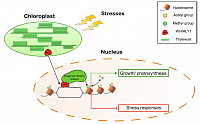
Whirly1 Model
28 March 2023
Whirly keeps barley green
Drought stress leads to early senescence in crops that severely affects yield. A study led by Klaus Humbeck at the MLU's Institute of Biology with contributions from our lab now shows that having more Whirly1 protein delays this drought-induced senescence by reducing levels of the stress hormone abscisic acid and by modifying histones, nuclear proteins that regulate gene expression. These findings indicate that Whirly1 is a promising target gene in breeding for drought resistance. The article is published in IJMS and can be accessed here .

20 March 2023
Welcome Tobias!
Today, Tobias Biermann has started as our new secretary. Tobias will be in charge of finances and personell, support international lab members, and care for the many organisational matters indispensable to keep the lab up and running.
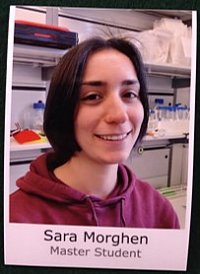
1 March 2023
Benvenuto Sara!
Today, Sara Morghen has arrived from Italy for a lab internship. Sara is a graduate student of Molecular Biology at the University of Padua and will share our excitement on plant calcium signalling.
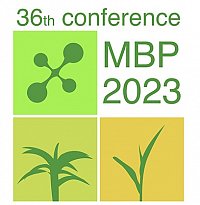
6 - 9 February 2023
Participation at Molecular Biology of Plants Conference
Srijana Rai and Oriana Mariani presented two posters at the 36th Conference on Molecular Biology of Plants at Hennef. Following her awards at the conferences at Milan and Bonn last year, Srijana received another prize for her fantastic multimedia poster. Congratulations for scoring that hat trick, Sri!
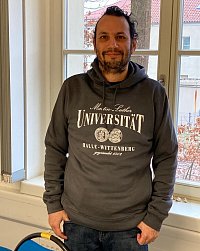
27 January 2023
Farewell and Adiós, Santiago!
Today, we had to say good bye to our postdoc Santiago Alejandro. Santiago joined us in 2017 to work on manganese efficiency and metal transport in sugar beet. His work yielded intriguing new insights in the functioning of this crop, with a comprehensive paper just published a couple of days ago (see below) and more to follow. His authoritative review article on manganese in plants has evolved to one of the 1% most highly cited articles in plant science. More recently, he has been concerned with processes that determine cadmium accumulation in cereal grains, an issue of great importance for food safety. Santiago has been a formative member of our team, and we will miss him very much. From now, as research scientist in the R&D department of a leading fertilizer manufacturer, he will contribute his great knowledge on nutrients to the development of novel cropping practices. Santiago, we wish you all the very best for the future and a happy family life in Münster!
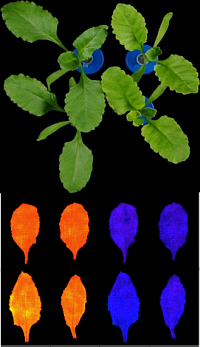
25 January 2023
Sugar beet isn’t Arabidopsis with a tap root - study reveals high diversity in metal handling by dicot plants
Manganese (Mn), iron (Fe), and zinc (Zn) are essential for diverse processes in plants, but their availability from soil is often limiting or excessive. Transport proteins in cellular membranes confer the efficient usage or detoxification of these metals. Knowledge about these processes may be harnessed to improve crops. An important family of metal transporters are the CATION DIFFUSION FACILITATORs (CDFs), called METAL TOLERANCE PROTEINs (MTPs) in plants. Roles of these transporters have been inferred mainly from work on model species, like Arabidopsis thaliana. It is unclear to what extent these findings can be generalized. In a new study, we show that MTPs in sugar beet often deviate from their Arabidopsis counterparts in terms of transported metals, subcellular localization, as well as regulation upon exposure to Fe, Mn, and Zn deficiencies and Mn and Zn toxicities. Also, the ion composition of sugar beet responds differently to metal nutrient imbalances than that of Arabidopsis. These results suggest that metal homeostasis and the employment of the MTP toolbox is highly diverse amongst different plant species, which questions the general applicability of models derived from Arabidopsis and calls for functional studies of these processes on crop plants. The article is published in Plant, Cell & Environment and can be accessed here.
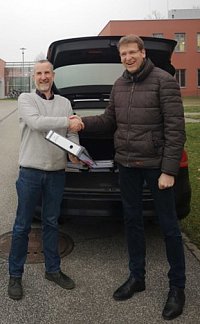
25 January 2023
Change at the Helm of the German Society of Plant Nutrition
For four eventful years, Edgar Peiter and Stefanie Höller have been in office as first chairman and managing director, respectively, of the German Society of Plant Nutrition (DGP) . Today they handed over the affairs to the newly elected board of directors, represented by Klaus Dittert as the new first chairman and Tino Kreszies as new managing director (both University of Göttingen). We wish the new team, which also includes Christoph-Martin Geilfus as second chairman and Patrick Bienert as assessor, every success in leading our professional society from strength to strength.
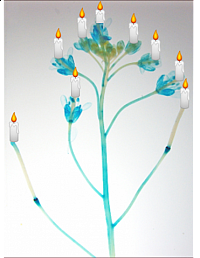
December 2022
Merry Christmas and a Happy New Year!
The Peiter lab wishes to all its members, alumni, students, and friends a peaceful Christmas and all the very best for 2023!

17 November 2022
Improving iron nutrition of broccoli
Broccoli is a vegetable of very high nutritional value. However, iron deficiency can cause reduced growth and yield. A study led by Ahmad Kabir at the University of Georgia with contributions from our lab now shows that a nitric oxide donor is able to improve iron acquisition and iron status of this plant. This finding may lead to strategies to improve iron nutrition of broccoli. The article is published in Plant Physiology and Biochemistry and can be accessed here .
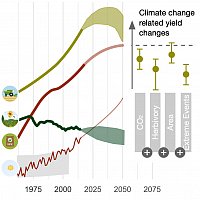
10 November 2022
Contribution to perspective article on agriculture and food security under a changing climate
The anthropogenic rise in CO2 provokes massive disruptions in the global climate that will have a tremendous impact on agriculture and food security. In a perspective article led by Ralf Seppelt (UFZ Halle-Leipzig) with contributions of Stefan Klotz, Martin Volk (both UFZ) and Edgar Peiter, the available evidence on how the global food system might look given a global temperature increase by 3° is reviewed. We show that a moderate gain in the area suitable for agriculture is confronted with substantial yield losses through strains on crop physiology, multitrophic interactions, and more frequent extreme events. Self-amplifying feedbacks are unresolved and might lead to further losses. In light of these uncertainties, we see that complexity is underestimated and more systemic research is needed. Efficiency gains in agriculture, albeit indispensable, will not be enough to achieve food security under severe climate change. The article is published in iScience and can be accessed here .
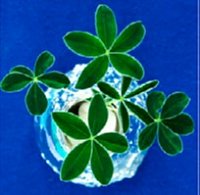
21 October 2022
How lupins detoxify manganese
White Lupins have the ability to mobilize the mineral nutrient phosphate (P) with outstanding efficiency by releasing organic compounds into the soil. This P mobilization also leads to a mobilization of manganese (Mn), which is taken up and accumulates to concentrations that would be highly toxic to most plants. The molecular basis of the Mn detoxification mechanism in White Lupin has been unknown until now. In a collaborative study, Uwe Ludewig and his PhD student Philipp Olt at Hohenheim University, jointly with our postdoc Santiago Alejandro and his Master students Edith Ramos and Johann Fermum have identified and characterized a transport protein that moves Mn into vacuoles of White Lupin, where it is safely stored. This transporter provides a mechanistic explanation for the high Mn accumulation and Mn tolerance in this species. The article is published in Physiologia Plantarum and can be accessed here .

4 - 6 October 2022
Participation at Plant Nutrition Conference
Most of our lab went to the 54th Annual Conference of the German Society of Plant Nutrition (DGP), which was organized by the Technical University Munich and held at its Science and Study Centre in Raitenhaslach, nestled in a most scenic location. Santiago and Minh were selected for oral presentations; Bastian, Nico, Sri and Steffi presented posters. The conference was followed by the annual DGP member’s assembly that included a traditional Weisswurst breakfast. A great Thank You! to the organizers for hosting such a fantastic meeting.
1 October 2022
Good bye, Julia!
Today, our office administrator Julia Rödiger has climbed the career ladder and started a new position in the University’s central administration. We have been very lucky and happy to have Julia as a group member in the past years. She not only fantastically handled all the many organisational matters of the lab and solved many problems, but also organized great lab outings and cute birthday pressies. We wish Julia a lot of joy and success in her new position and will stay in touch.
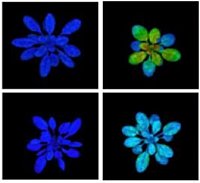
26 September 2022
Regulation of manganese uptake by calcium signalling
Manganese is indispensable for photosynthesis and other processes in plants, like cell wall synthesis (see news of 22 Aug 2022). On soils with low manganese availability, crop growth and yield can be severely reduced. However, it has remained largely unknown how fluctuations in manganese supply are sensed and signalled and how the activity of manganese transporters is regulated. A study led by the groups of Cun Wang (Northwest A&F University, China) and Jörg Kudla (University of Münster) revealed that novel multicellular calcium oscillations are triggered by manganese depletion. These calcium signals are believed to activate a set of protein kinases that again regulate the principal manganese uptake transporter, NRAMP1. Our postdoc Stefanie Höller contributed photosynthesis analyses to this exciting work, that delineates a mechanism of calcium-regulated manganese uptake by plants, which may be a key to increase manganese uptake efficiency of crops. The article is published in the Proceedings of the National Academy of Sciences of the USA (PNAS) and can be accessed here. A press release by the University of Münster can be found here .
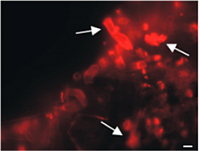
22 September 2022
Regulator of fungal cell wall synthesis revealed
The composition of the fungal cell wall is a crucial factor for virulence of pathogens. A study led by the Institute’s Phytopathology group of Holger Deising has identified the RHO4 protein of the devastating maize anthracnose fungus as regulator of cell wall synthesis, crucial for hyphal growth and infection of its host plant. Kathrin Thor, a former postdoc of our lab, has contributed imaging analyses that show a reduced abundance of the cell wall component beta-1,3-glucan and a compensation by higher chitin abundance in the absence of the RHO4 protein. The article is published in the Journal of Fungi and can be accessed here.
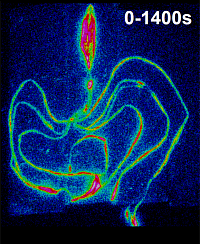
18 September 2022
Elucidation of calcium signals in barley
Plants are continuously exposed to changing environmental conditions and biotic attacks that affect growth. In crops, inability to respond appropriately to stress has detrimental effects on agricultural production and yield. Calcium plays a central role in rendering plants resilient to unfavourable conditions. Upon perception of the stress, transient or repetitive rises in free cytosolic calcium trigger mechanisms of defence or adaptation. However, research on such calcium signals has mostly been pursued in the model plant Arabidopsis, while in crop species these events are little investigated. In a collaboration with the labs of Ute Vothknecht (University of Bonn) and Karl-Heinz Kogel (University of Gießen), we therefore introduced a calcium reporter gene in the crop species barley, which enabled us detect calcium signals upon biotic and abiotic stresses and compare those to Arabidopsis. Beside common patterns, notable differences were identified that may relate to different stress responses of both species. The newly generated transgenic barley reporter lines present a valuable tool to further analyse and improve mechanisms of calcium signalling and stress reponse in this crop. The article is published in BMC Plant Biology and can be accessed here.

28 August - 1 September 2022
Participation at Plant Science Conference
Nico Rössner, Srijana Rai, Bastian Meier, and Edgar Peiter joined the International Conference of the German Society for Plant Sciences (“Botanik-Tagung”) at Bonn. Together with Gabriel Schaaf, Edgar chaired the fantastic session on Molecular Plant Nutrition, which was supported by the German Society of Plant Nutrition. Edgar and Bastian presented talks on calcium signals in barley and manganese transport in the Golgi. Sri again received an award for her multimedia poster on systemic calcium signal imaging. Congratulations, Sri!
The next Botanik-Tagung will take place in 2024 at Halle. We look forward to welcome the Plant Science community to our great city!

30 August - 01 September 2022
Participation at Plant Metals Conference
Santiago Alejandro and Stefanie Höller presented at talk and a poster at the annual conference of the PLANTMETALS COST Action on Trace Metal Metabolism in Plants, which was held in Ankara (Turkey).
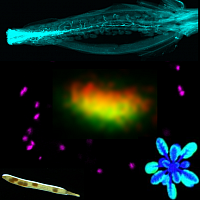
22 August 2022
Mechanism of manganese supply for cell wall synthesis revealed
Manganese is essential for life on earth. The element catalyses photosynthetic water splitting in the chloroplast, the process that drives CO2 fixation and that produces the atmosphere’s oxyen. Manganese is also required by glycosyl transferases, enzymes that synthesise the plant cell wall components pectin and hemicellulose and hence determine plant growth. These biosynthetic reactions take place in the cell’s Golgi apparatus, but it is not well understood how manganese enters this compartment. We have identified a transport protein, BIVALENT CATION TRANSPORTER 3 (BICAT3) that supplies the Golgi apparatus with manganese and that determines the distribution of manganese between chloroplast and Golgi under manganese-limiting conditions, as they occur frequently in the field. The BICAT3 protein may hence prove as a yield limiting bottleneck for plant performance at low manganese availability and may be a target for crop improvement. The article is published in Plant Physiology and can be accessed here. It has been covered in a News & Views article by Stefanie Wege that can be accessed here . A press release by the University can be found here.

11-13 July 2022
Participation at Plant Calcium Signalling Conference
Nico Rössner, Srijana Rai, and Edgar Peiter joined the PCS2022 conference in Milan (Italy), where we again won a poster award. Congratulations, Sri!

Drei Grad Mehr
7 July 2022
Contribution to book chapter on agriculture in a hotter world
Global climate change, provoked by the anthropogenic rise in CO2, is progressing at an alarming pace. The new book “3 Grad Mehr” (available here ) presents an outlook by scientists of different fields to looming scenarios that we will face in a hotter world. A widespread collapse of ecosystems and societies can now only be prevented by massive changes in human behaviour and economy, including the way we produce and distribute food. Ralf Seppelt, Stefan Klotz, Martin Volk (all UFZ Halle-Leipzig) and Edgar Peiter contributed a chapter on agriculture in a hotter world to this eye-opening volume.
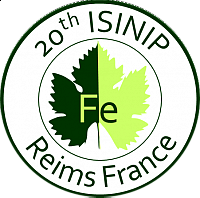
4-7 July 2022
Participation at International Symposium on Iron Nutrition and Interactions in Plants
Stefanie Höller presented an award-winning poster on our work on manganese and iron translocation at the 20th ISINIP conference, which was held in Reims (France). Congratulations, Steffi!
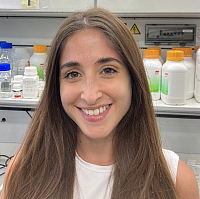
1 July 2022
Bienvenida Oriana!
Today, Oriana Mariani started her PhD within the DFG Research Training Group 2498, which focuses on plant organellar interactions. Oriana has obtained her degree at the Universidad Nacional de La Plata in Argentina. In her project, she will elucidate mechanisms of calcium transport in cellular compartments and the relevance of this for plant performance. Let it glow!
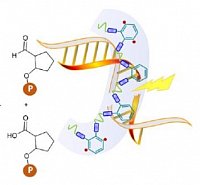
19 May 2022
Polymers that cleave DNA
Enediynes are structures of promising antitumor antibiotics that become active upon a Bergman cyclization reaction, which creates a reactive radical. This radical can cause DNA strand breaks, inducing programmed cell death. The lab of Wolfgang Binder (MLU Institute of Chemistry) has now achieved to embed enediynes in the main chain of a polymer. Their DNA cleavage activity can be modified by chain length. These novel polymers can be the basis to design selective DNA-cleaving drugs. Our lab contributed to the DNA cleavage assays of this exciting work, which was led by Yue Cai. The paper is published in Polymer Chemistry and can be accessed here .
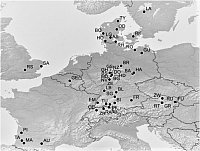
4 March 2022
Large study on phosphorus fertilization recommendations in Europe
Phosphorus (P) is a limited resource, and excessive P fertilization can lead to environmental problems. P fertilization recommendations aim to reach or maintain an optimum level of plant-available P in the soil. A comparative analysis led by Kristin Steinfurth and Uwe Buczko at the University of Rostock revealed that thresholds of P recommendations vary by a factor of up to five between European countries. Furthermore, an analysis of European long-term P fertilization experiments showed that those P recommendation thresholds are often much higher than necessary for optimum yield. This calls for a reconsideration P fertilization recommendations in some countries for a more sustainable and environmentally friendly P fertilization. We contributed data sets from our long-term field experiment, that has been running since 1949, to this large-scale analysis. The paper, which is published in Agriculture, Exosystems & Environment, is available online and can be accessed here .
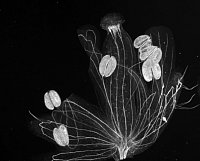
December 2021
Merry Christmas and a Happy New Year!
The Peiter lab wishes to all its members, alumni, students, and friends a peaceful Christmas and all the very best for 2022!
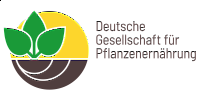
21 December 2021
English DGP websites
Today the German Society of Plant Nutrition (DGP) has launched its English web pages. The DGP is the platform of the Plant Nutrition community in Germany. It fosters scientific exchange, releases statements, and promotes young scientists. In response to the pandemic, the membership fee is fully suspended in 2022.
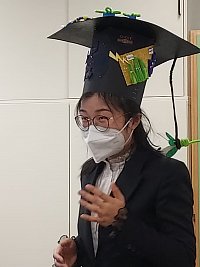
20 December 2021
Congratulations, Dr He!
Today Jie He very successfully defended her outstanding PhD thesis on the in-depth characterization of a manganese transporter, which plays an important role in cell wall formation in barley and Arabidopsis. Jie was funded by a CSC scholarship and later by the Agripoly-DPP graduate school. Before returning to China, she will stay in the lab as a postdoc to continue this exciting project. We wish her all the very best for the future and thank her for everything she contributed to the lab family!
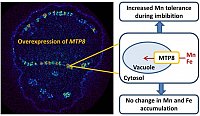
23 September 2021
Paper on metal storage in seeds
Iron and zinc deficiencies are widespread nutritional disorders in humans, affecting more than half of the world’s population. Moreover, improved micronutrient accumulation in seeds can contribute to seedling vigour, abiotic and biotic stress resistance, and enhanced crop yields. Thus, understanding the mechanisms of micronutrient allocation in the developing seed is of great importance. Based on the involvement of the vacuolar transport protein MTP8 in manganese and iron homeostasis in developing and germinating seeds, we hypothesized that its overexpression can confer tolerance to high Mn concentrations during imbibition and bring about an increase in metal concentration in the seed. The latter would render this transporter a promising target for genetic biofortification. Besides determining metal concentrations, we employed high-resolution synchrotron micro X-ray fluorescence (µXRF) tomography to investigate the impact of MTP8 on metal distribution in seeds. The results indicate that, albeit overexpression of MTP8 entails increased tolerance to high Mn levels during seed imbibition, it does not alter Mn and Fe accumulation and allocation. Click here to access the article, which is published in Plant Biology.
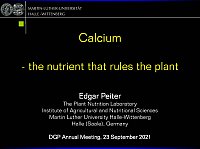
22-24 September 2021
Participation at Plant Nutrition conference
Six of us participated at this year's Conference of the German Society of Plant Nutrition that was held online and organized by our colleagues at Kiel. Edgar Peiter gave a talk covering our work on calcium transport and signalling, and we also presented five posters.

22 September 2021
DGP Annual Meeting
Today the annual members' meeting of the German Society of Plant Nutrition (DGP; www.plant-nutrition.de ) was held online. Edgar Peiter and Stefanie Höller were re-elected as chairman and manager, respectively, and will strive to advance the field and bring together the community.
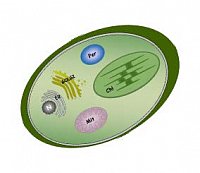
19-23 September 2021
Participation at FEBS workshop
Nico Rössner presented a poster at the 3rd FEBS workshop on Plant Organellar Signalling at Primosten (Croatia).
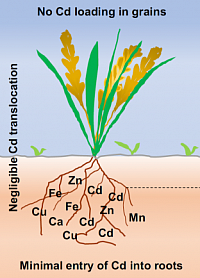
18 June 2021
Bringing together biofortification and cadmium reduction
Genetic biofortification of cereals is an effective means to fight iron and zinc malnutrition in humans (“hidden hunger”). Conversely, cadmium (Cd) is a highly toxic heavy metal that accumulates in grains. Unfortunately, most approaches to reduce Cd in food also have a negative impact on iron, zinc, and manganese. In a vision paper published in New Phytologist, Sakthivel Kailasam of Michigan State University and Edgar Peiter have drafted a potential way out of this dilemma. They propose a directed evolution of transport proteins towards higher selectivity against Cd by employing new genome editing techniques. Click here to access the article.

7 May 2021
New DGP website
Today the German Society of Plant Nutrition (DGP) has launched its new web pages. The DGP represents the scientific area of Plant Nutrition in Germany. Edgar Peiter and Stefanie Höller are currently serving as president and manager, respectively.
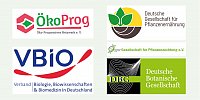
18 March 2021
Open Letter: The importance of Plant Science to solve the trilemma of land use
In its recent assessment “Rethinking Land in the Anthropocene: from Separation to Integration” , the German Advisory Council on Global Change (WBGU) has proposed a comprehensive set of solutions to solve the “trilemma of land use”, i.e. reaching the targets of climate-change mitigation, avert the dramatic loss of biodiversity, and make the global food system sustainable. Unfortunately, plant science, including novel methods of crop improvement, is not viewed as part of the solution in this assessment. In an open letter to the federal ministers of the environment (Svenja Schulze), and education and research (Anja Karliczek), a number of plant science institutions and societies, including the German Society of Plant Nutrition , address this critical shortcoming. They stress the importance of plant science and novel plant breeding approaches in the development of a sustainable agriculture, and they offer to contribute their expertise in plant and crop science. Click here to read the open letter (pdf).
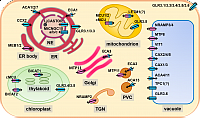
12 March 2021
Review on calcium and manganese in organelles
Calcium and manganese are essential elements for plants and have physicochemical similarities. They are assigned specific functions within cellular compartments, but share many transport mechanisms across cellular membranes. Despite the points of interaction, those elements are usually investigated separately. Our latest review, to which a number of lab members contributed, takes calcium and manganese out of this isolation. It highlights our current mechanistic understanding, and points to open questions, of their functions, their transport, and their interplay in all organelles of the plant cell. Mechanisms in animals and yeast are taken into account where they may provide a blueprint for processes in plants. The article is published in Plant Physiology and can be accessed here.
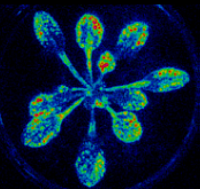
14 February 2021
Paper on a new player in systemic calcium signalling
Plants respond to wounding and insect attack with a rise in their internal calcium concentration. These „calcium signals“ propagate throughout the plant and inform yet intact plant parts of the stress, so that the entire plant can launch defense responses. It is not well understood how those calcium signals are produced. The protein Annexin1 has been known to exhibit calcium channel activity. A new study, led by Axel Mithöfer at the MPI for Chemical Ecology in Jena, with calcium imaging experiments from our lab, shows that Annexin1 is an important player in the plant’s defense responses. Plant devoid of Annexin1 were defective in the generation of systemic calcium signals, had a dimished hormone response, and did not fend off attacking insects. The article is published in New Phytologist and can be accessed here .
Contact
Kontakt
Professur für Pflanzenernährung
Betty-Heimann-Strasse 3
06120 Halle (Saale)
Telefon: ++49 (0) 345 5522420
Telefax: ++49 (0) 345 5527113
plant.nutrition@landw.uni-halle.de

